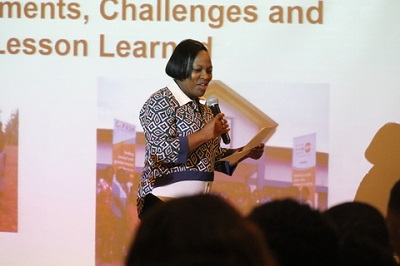
An advocacy and sensitisation programme to ensure zero tolerance for Female Genital Mutilation (FGM) by 2030 was held in Accra, yesterday.
The programme was organised by the United Nations Population Fund (UNFPA) Ghana in collaboration with the Ghanaian Association for Women’s Welfare (GAWW).
The event which was held on the theme; “Translate political decisions into concrete actions at the grassroots to reach the goal of zero tolerance for Female Genital Mutilation by 2030,” was attended by chiefs, opinion leaders, students and women groups.
Ms Erika Goldson, the Deputy Representative of the UNFPA, said in order to eradicate the act by 2030 there was the need to galvanise the efforts of traditional leaders and opinion leaders at the grass roots.
She added that ending FGM was critical to realising Sustainable Development Goals (SDGs) on health, quality education among others.
She said even though the act was on the decline in the country, its complete elimination required dialogue and actions that engaged families and communities in order to ensure that the practise was abolished.
Ms Goldson noted that in an attempt to escape from the laws, perpetrators had sought to the ‘Cross-border’ aspects where they engage in the act at their new settlement.
The UNFPA deputy representative condemned the act because it violated the human rights of women and girls as it had long-term effects on victims, saying “the negative impact of this act goes beyond the victim and trickles down to the community, nation and world at large.”
She called on religious, traditional, community leaders, security agencies and the media to educate and sensitise citizens on the dangers associated with the act and ensure that perpetrators were prosecuted.
Mrs Gertrude Eunice Maasodong, the President of GAWW in her submission indicated that the practise was still ongoing adding that perpetrators applied shea butter and hot oil on victim’s clitoris at tender ages.
This, she noted, was dehumanising as victims went through pain which affected their health and mental well-being.
Mrs Maasodong said there was the need to educate the people at the grassroots on the consequences of the act in order to eschew the practice.
Madam Evelyn Borbor, National Coordinator of the Domestic Violence and Victims Support Unit (DOVVSU), on her part said her outfit was on the look out to ensure the total elimination of the practice as enshrined in the Criminal Offenses Act 1960 Act 29 of the 1992 constitution.
Presenting statistics from the United Nations International Children’s Emergency Fund (UNICEF) on FGM, she indicated that four per cent of girls and women of reproductive age in Ghana had undergone the act with 2.4 per cent of the total population experiencing it, hence the need to increase education on the practice to ensure its total elimination.
BY ALLIA NOSHIE







